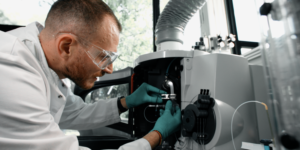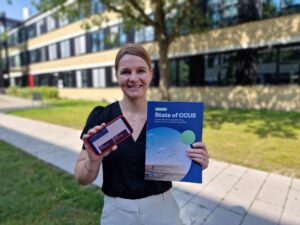For a Danish version of the press release, follow this link.
Danish research and innovation in carbon capture, utilisation, and storage (CCUS) play a crucial role in Denmark’s climate ambitions. However, further research and faster technology maturation are needed to meet the ambitious Danish climate goals, according to Direction 2050: The Danish CCUS Roadmap 2024.
The latest Climate Status and Projections show that Denmark is well on its way to meeting the 70% reduction target for 2030. CO2 capture, utilisation, and storage play a central role in the Danish government’s 2030 plans, and Danish research and innovation in CCUS technologies have been essential in providing the necessary tools for climate transition. This is evident in the newly published comprehensive mapping of CCUS technologies in Denmark, Direction 2050: The Danish CCUS Roadmap 2024.
“The CCUS Roadmap 2024 clearly shows that Danish research and innovation in CCUS have played and will continue to play a crucial role in enabling Denmark to meet its ambitious climate goals, while our innovative solutions can inspire other countries to implement CO2 capture, utilisation, and storage to combat climate change,” says Karina Marie Søgaard, Partnership Director, INNO-CCUS.
Although Denmark is well on its way to meeting the 2030 reduction target, the journey toward climate transition continues. The government aims for negative emissions by 2050, and CO2 capture, utilisation, and storage are one of the main pillars. Danish research and innovation are at the forefront of CCUS, yet more efforts are needed to fully realise the potential of these technologies.
“It is clear that the pace of Danish research and innovation must be sustained and intensified to achieve our goals. More research, faster technology maturation, and scaling up both technologies and collaboration forms within all aspects of CCUS are needed if we are to meet the 2050 climate goals. By developing and implementing new project models and forms of collaboration in the coming years, we can effectively provide the necessary tools for climate transition, focusing on technology development to reduce costs and energy consumption,” says Karina Marie Søgaard, Partnership Director, INNO-CCUS.
Direction 2050: The Danish CCUS Roadmap 2024 is prepared in collaboration with Rambøll and the more than 80 Danish stakeholders in the INNO-CCUS partnership. It provides a detailed status of developments, opportunities, and the strategic paths that Denmark should pursue to realise the potential of CCUS technologies for the benefit of the climate transition.
“Danish research within some of the CCUS technologies, such as capture and storage from point sources, is so advanced that it drives research and innovation within the entire CCUS field and can soon deliver significant results in the form of reductions. Other technologies have not yet reached the same maturity, and here it may be more appropriate to explore how innovative technology developments from abroad can best be integrated into Denmark. This is highlighted in Direction 2050: The Danish CCUS Roadmap 2024,” says Karina Marie Søgaard, Partnership Director, INNO-CCUS.
Direction 2050: The Danish CCUS Roadmap 2024 is presented today in Festsalen at the National Museum of Denmark, and the updated roadmap will again be at the top of the agenda when key representatives from industry, knowledge institutions, and public institutions gather on 11 June for The Danish CCUS Summit 2024 in Copenhagen.
Inquiries regarding Direction 2050: The Danish CCUS Roadmap should be directed to:
Karina Marie Søgaard
Partnership Director, INNO-CCUS
kms@inno-ccus.com
Press inquiries should be directed to:
Peter Zacher
Press Advisor
peter.zacher@gknordic.com
Direction 2050 The Danish CCUS Roadmap 2024:
The Danish CCUS Roadmap provides a detailed status of developments, opportunities, and the strategic paths that Denmark should pursue to realise the potential of CCUS technologies. It was prepared on behalf of the more than 80 Danish stakeholders in the INNO-CCUS partnership in collaboration with Rambøll and was most recently published in 2021. The CCUS Roadmap 2024 aims to position Denmark within CCUS research. It represents a shared CCUS vision that maps out the latest breakthroughs in CCUS technologies and outlines clear strategies for scaling up technologies to help Denmark achieve its climate ambitions by 2050.
INNO-CCUS:
INNO-CCUS is a mission-driven public-private partnership in Denmark that focuses on promoting research, development, and implementation of CO2 capture, storage, and utilisation technologies. INNO-CCUS is one of Denmark’s four mission-driven partnerships aimed at accelerating the green transition. The partnership brings together more than 80 stakeholders, including knowledge institutions, private companies, public entities, and organisations, to promote innovation and accelerate the deployment of CCUS solutions. INNO-CCUS supports the development of CO2 capture, storage, and utilisation technologies by bringing together key actors within the CCUS field. INNO-CCUS works to promote effective, scalable, and economically sustainable CCUS solutions to ensure a significant contribution to achieving Denmark’s climate goals.
Learn more about INNO-CCUS here: https://inno-ccus.dk/






